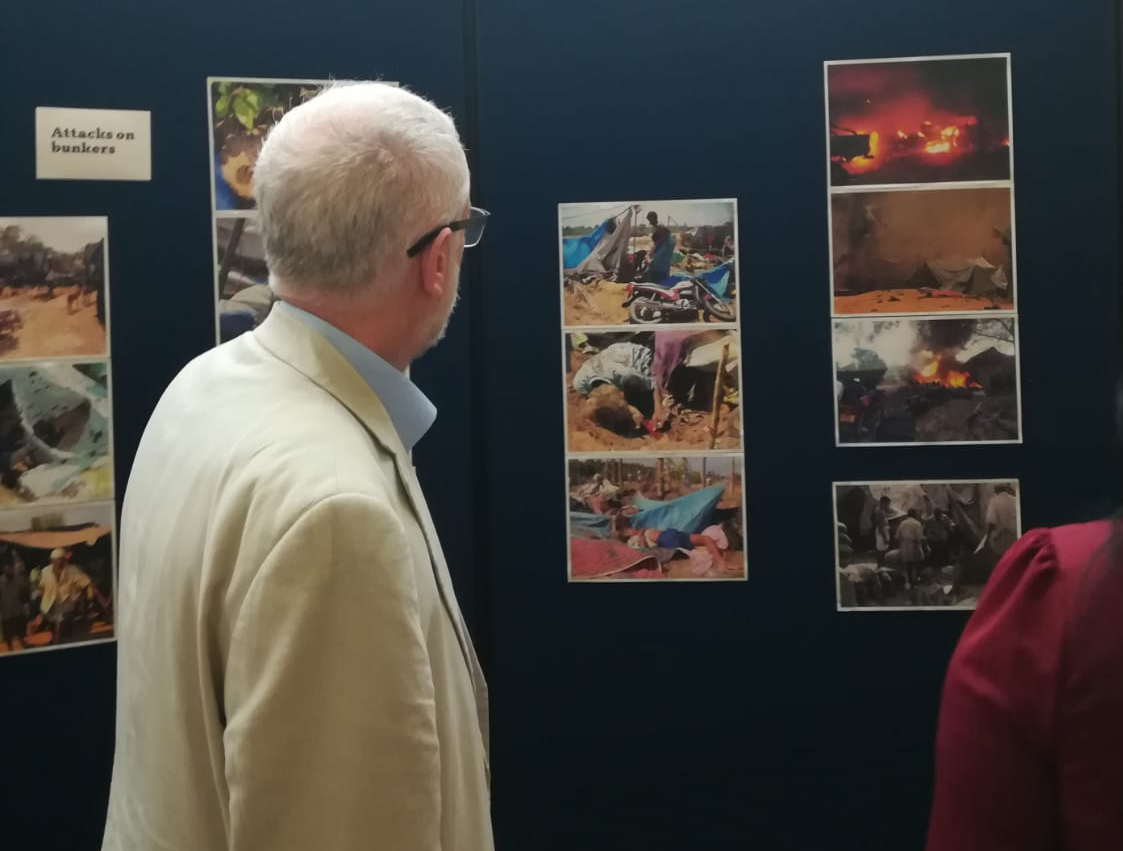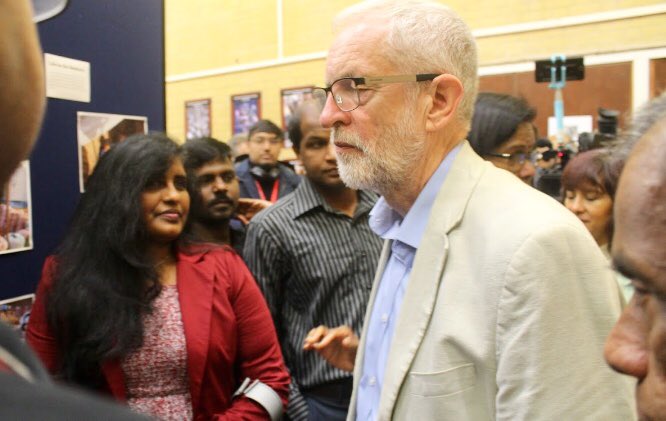If the Sri Lankan government continues to reject key tenets of a UN Human Rights Council resolution on accountability then “clearly something has to be done in another direction,” UK Labour Party leader Jeremy Corbyn told the Tamil Guardian in an interview this weekend.
“There’s been systematic abuse of the Tamil people,” Corbyn told reporters at the sidelines of the Tamils of Lanka exhibition, organised by the Tamil Information Centre (TIC) in London. “That is very clear. There’s been unbelievable levels of killing of Tamil people from the 1980’s onwards and the massacre which we are commemorating 10 years ago is an example of that.”
The British opposition leader opened the second day of the exhibition, which was held to mark a decade since the massacres at Mullivaikkal in which the Sri Lankan military killed tens of thousands of Tamils. A day earlier, British parliamentarians joined thousands at events in London, expressing messages of solidarity and pledging to work towards justice for the atrocities.
“I think it is up to an international court to declare whether it is a genocide or not but certainly that’s a case that has to be answered,” added Corbyn.
Speaking to the Tamil Guardian, the Labour Party leader said he wanted to “strengthen and empower” the UN Human Rights Council and wanted to see Sri Lanka abide by commitments made in previous resolutions.
“I’d say go back to the Human Rights Council, say to the Sri Lankan government - a resolution was carried in 2015, four years ago, very clear in its delineation of what it wants done, very clear in its criticism,” he said. “There has to be a response from the government of Sri Lanka. If the response is simply to reject, then clearly something has to be done in another direction.”
When questioned on referring Sri Lanka to the International Criminal Court (ICC), an option that the International Commission of Jurists (ICJ) said “would be fully warranted, Corbyn responded, “Many, many options are open, including the words that the ICJ have used and taking a case there”.
“Any member of the United Nations that is subject to a human rights investigation and every country that is under the system that the Human Rights Council has must respond and must deal with the issues that have been brought to their attention. It’s not good enough for any government to say simply “No, we don’t want to do it”.”
“We will go back to the UN Human Rights Council to demand action by them on it and also ask member states to look their relationship with any country that decides to reject a Human Rights Council resolution.”

Corbyn looking at photographs of Tamil civilians killed by Sri Lankan bombs in Mullaivaikkal a decade ago.
Britain must also be one of the UN member countries that examines its own relations with states such as Sri Lanka who commit rights abuses said Corbyn. Ten years ago, he was amongst several other politicians who called for economic sanctions to be placed on Sri Lanka as the military continued to bomb Tamil civilians. After the armed conflict ended, the veteran parliamentarian supported a campaign by Tamil rights activists, which called on the England and Wales Cricket Board (ECB) to boycott the Sri Lankan cricket team, as it had done with Zimbabwe several years earlier. “I, the undersigned, call on the ECB to take a similar principled position on Sri Lanka and deny Sri Lanka the right to behave as if violence and abuse against people is playing by the rules,” read a petition he signed.
If a Labour government were to come in to power then Corbyn reiterated that human rights would be at “the core of our foreign policy”. “We will take up human rights issues with any government and form and frame our trade policy, our arms sales policy and our military training policy around that,” he said. “We have to be assured that any country we’re dealing with has full respect for human rights.”
His comments come after a British navy vessel arrived in Colombo last month and carried out a joint naval exercise with the Sri Lankan military, despite continued concerns of impunity for rights violations committed by Sri Lankan troops. The British government has been criticised for its engagement with the Sri Lankan security forces, which has included Police Scotland training members of Sri Lanka’s notorious Special Task Force (STF).
In the last week alone there have been eye witness reports and videos emerging of the collusion of Sri Lankan security forces with rioting Sinhala mobs responsible for the widespread anti-Muslim violence - incidents that the Labour lead also touched on when speaking to reporters.
"We have to collect any evidence which shows who was involved in promoting the anti-Muslim riots,” he said.
“Therefore that means, if there are suggestions that anyone that was trained in this country or somewhere else that was involved in promoting those atrocities then they must be brought to book.”

Corbyn had earlier told the exhibition of his long relationship with the Tamil community, starting from the early 1980’s. "I want to see in Sri Lanka a peace process,” he said. “A recognition of the horrors that have gone in the past and of the rights of people of their own self expression".
"If you trace the history back to the language riots of 1958 and the discrimination before that you can see how it developed,” he added. “Those who tried to destroy the history of the Tamil people with the burning of the library in 1981… it didn’t work. It merely strengthened their resolve."
“We have to work for long term peace, we have to work for recognition, we have to work for the right to people anywhere in the world to self determination.”
We need your support
Sri Lanka is one of the most dangerous places in the world to be a journalist. Tamil journalists are particularly at threat, with at least 41 media workers known to have been killed by the Sri Lankan state or its paramilitaries during and after the armed conflict.
Despite the risks, our team on the ground remain committed to providing detailed and accurate reporting of developments in the Tamil homeland, across the island and around the world, as well as providing expert analysis and insight from the Tamil point of view
We need your support in keeping our journalism going. Support our work today.
For more ways to donate visit https://donate.tamilguardian.com.

